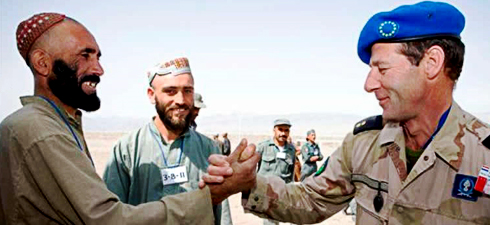The European Union prides itself on its so-called “civilian power”. If necessary, the EU is meant to be able to deploy almost 10,000 police officers to faraway crisis zones, to benefit from the expertise of more than 40,000 diplomats and to dip into the world’s largest development budget. Except that this "civilian force" is largely illusory according to Daniel Korski and Richard Gowan, the authors of a report on failed states published by the European Council on Foreign Relations (ECFR).
"No peacekeeping mission template exists. Neither the UN or the United States can say otherwise. However this does not mean that we cannot learn from them in certain fields. Let us take for example the efficiency of American diplomats, or the logistic of UN missions which are perfect", says Daniel Korski, who took part in international peacekeeping missions in trouble-spots including the Balkans and Afghanistan. Brussels most serious problem is its lack of staff trained to intervene efficiently. Daniel Korski highlights the fact that several years after its launch, even one of the biggest European missions - the EU police mission in Afghanistan - is managed by 150 agents instead of the 400 originally planned.
Mission templates don't travel well
Yet the report's writers assert that even a strong contingent of trainers and European civil servants will not guarantee the success of a mission. As demonstrated in the Balkans, where police sent over by the European Union a decade ago to bring law and order are still dealing with international criminal organizations that consider this region as a "land of opportunities".
Worse yet, these inefficient mission templates as well as the solutions found, in the specific context of the Balkans, are exported and applied thoughtlessly to nations that differ completely both in geographical and cultural terms. It is mainly for this reason that European missions are still considered "small, lacking in ambition and strategically irrelevant" - ten years after the creation of the European Security and Defence Policy (ESDP).
Interesting article?
It was made possible by Voxeurop’s community. High-quality reporting and translation comes at a cost. To continue producing independent journalism, we need your support.
Member states at fault
This situation does not solely stem from Brussels' negligence or indifference. The member states are also to blame. The paper's authors divided EU countries into four groups: "the professionals", "the strivers", "the agnostics" and "the indifferent". Poland belongs to the third group of nations, little convinced by the value of its civilian missions.
Korski and Gowan show no mercy in pointing out Warsaw's weaknesses: its personnel nearly entirely consists of policemen (due to an article in Polish law forbidding the deployment of civilian personnel), then there are problems relating to planning, as well as coordination between different ministries. Despite all this, Poland fulfilled 44% of its commitments. A sterling result compared to Spain and Great Britain (where mission staff are very well prepared, the British being ranked as "professionals" in this field).
FOREIGN AFFAIRS
EU’s new diplomatic body needs to be watched
One of the consequences of ratification of the Lisbon Treaty is the imminent creation of a new EU diplomatic service, the European External Action Service. David Cronin in the Guardian argues that this new body with an international network of 5,000 officials answerable to the new High Representative “should be carefully monitored.” The reason for Cronin’s reservations being that while the service will be entrusted with EU foreign and security policy, it may well also handle international trade and development aid. “This carries the enormous risk that aid that should be used for one purpose only – to fight poverty – will become subservient to a more strategic agenda based on considerations of what is in Europe's own interests.” Such a policy, Cronin argues, has already influenced allocations in recent years. “Eager to play their part in George Bush's war on terror, EU officials have sought to use part of development aid earmarked for the Philippines, Colombia, Indonesia, Pakistan and Malaysia for security projects.” Aid is also linked to countries agreeing to curb the flow of migrants to Europe. “Security operations are sometimes necessary,” he concludes “but they must be financed from other budgets, not those reserved for the poor.”












